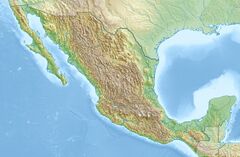Biology:Plectrohyla miahuatlanensis
| Plectrohyla miahuatlanensis | |
|---|---|
| Scientific classification | |
| Domain: | Eukaryota |
| Kingdom: | Animalia |
| Phylum: | Chordata |
| Class: | Amphibia |
| Order: | Anura |
| Family: | Hylidae |
| Genus: | Plectrohyla |
| Species: | P. miahuatlanensis
|
| Binomial name | |
| Plectrohyla miahuatlanensis Meik, Smith, Canseco-Márquez, and Campbell, 2006[2]
| |
| Synonyms | |
|
Sarcohyla miahuatlanensis (Meik, Smith, Canseco-Márquez, and Campbell, 2006) | |
Plectrohyla miahuatlanensis, or the Sierra Miahuatlan spikethumb frog, is a species of frogs in the family Hylidae. It is endemic to Mexico and only known from its type locality near Candelaria Loxicha on the Sierra de Miahuatlán (part of Sierra Madre del Sur) in Oaxaca.[3]
Taxonomy
A revision of the family Hylidae from 2016 places this species in the genus Sarcohyla,[4] but this classification is not yet widely adopted[1][5] and as of late 2016, the Amphibian Species of the World labels it as "provisional".[3] It belongs to the "Plectrohyla bistincta group" with the genus Plectrohyla,[2] all of them moved to Sarcohyla in the 2016 revision.[4] It is similar to Plectrohyla cembra and Plectrohyla sabrina.[2][3]
Description
The holotype, and the only known specimen, is a female that measured 42.5 mm (1.67 in) in snout–vent length. The coloration is distinctive: the dorsum is dark green, hidden surfaces are dark brown, flanks are yellow flanks, and canthal mask and lateral reticulations are dark brown. There is a yellow stripe that separates the dorsal from the ventral coloration on the limbs and above the cloaca. The fingers and toes are long and have large ovoid discs; webbing between the fingers is vestigial and slightly more developed between the toes.[2]
Habitat and conservation
The species' habitat is mesic pine-oak forest; a single female frog was found in late afternoon, inactive between the leaves of an arboreal bromeliad at 2,550 m (8,370 ft) above sea level.[1][2] Other amphibians found at the locality were salamanders Craugastor mexicanus and Bolitoglossa oaxacensis and frogs of the Exerodonta sumichrasti group.[2]
The area of type locality was covered with relatively intact forest at the time the holotype was collected in 2001. However, many slopes of the Sierra de Miahuatlan have been at least partially cleared for agriculture.[1][2]
References
- ↑ 1.0 1.1 1.2 1.3 Ariadne Angulo (2008). "Plectrohyla miahuatlanensis". The IUCN Red List of Threatened Species (IUCN) 2008: e.T135849A4210992. doi:10.2305/IUCN.UK.2008.RLTS.T135849A4210992.en. http://www.iucnredlist.org/details/135849/0. Retrieved 15 January 2018.
- ↑ 2.0 2.1 2.2 2.3 2.4 2.5 2.6 Meik, Jesse M.; Smith, Eric N.; Canseco-Márquez, Luis; Campbell, Jonathan A. (1 January 2006). "New species of the Plectrohyla bistincta group (Hylidae: Hylinae: Hylini) from Oaxaca, Mexico". Journal of Herpetology 40 (3): 304–309. doi:10.1670/0022-1511(2006)40[304:nsotpb2.0.co;2].
- ↑ 3.0 3.1 3.2 Frost, Darrel R. (2016). "Sarcohyla miahuatlanensis (Meik, Smith, Canseco-Márquez, and Campbell, 2006)". Amphibian Species of the World: an Online Reference. Version 6.0. American Museum of Natural History. http://research.amnh.org/vz/herpetology/amphibia/Amphibia/Anura/Hylidae/Hylinae/Sarcohyla/Sarcohyla-miahuatlanensis. Retrieved 16 December 2016.
- ↑ 4.0 4.1 Duellman, William E.; Marion, Angela B.; Hedges, S. Blair (19 April 2016). "Phylogenetics, classification, and biogeography of the treefrogs (Amphibia: Anura: Arboranae)". Zootaxa 4104 (1): 1–109. doi:10.11646/zootaxa.4104.1.1.
- ↑ "Plectrohyla miahuatlanensis". AmphibiaWeb: Information on amphibian biology and conservation. [web application]. Berkeley, California: AmphibiaWeb. 2016. http://www.amphibiaweb.org/cgi/amphib_query?where-genus=Plectrohyla&where-species=miahuatlanensis. Retrieved 16 December 2016.
Wikidata ☰ Q1237358 entry



